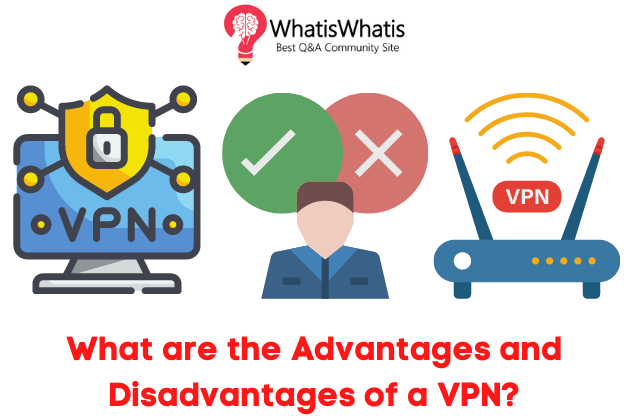While connecting to a VPN service does give us a sense of security, are they fully private? When you plan to buy a VPN service, most providers will guarantee 100% online safety, cybersecurity, and digital privacy, but they might be misleading you!
Read these advantages and disadvantages of using a VPN and decide for yourself if you would like to continue using one or switch to a higher-grade protection service.
What is a VPN?
A Virtual Private Network is an online tool that establishes a secure connection from a conventional Wi-Fi connection. It does so by masking the actual IP Address of a VPN user, ultimately making the user private and anonymous on the internet platform.

Ideally, a user’s online traffic passes through a secure tunnel and so the activities can’t be viewed or monitored by broadband carriers or attackers. Modern-day organizations require their employees to connect via a VPN because such a connection enables easy access to geo-restricted data libraries.
Advantages of a VPN
Here are all the good reasons why you should never browse without activating your VPN:
⦁ IP Address Cover
VPN is one of those rare tools that can mask your IP address which is your unique digital identity on the internet. It provides you with the opportunity to connect from any server worldwide and use your new virtual identity for whichever purpose you desire.
This means that if you are torrenting, the leechers and seeders would know somebody is online, but they will never know who you exactly are.
⦁ No More Incognito
VPN services that truly provide end-to-end encryption are enough to provide 100% network-level security. This means you don’t have to manually activate the incognito mode or browse through a private window.
A VPN guarantees to not store ‘digital footprints’ which is impossible without a VPN, even when you browse privately or delete search history. Your internet service provider, network management, or IT auditor might still poke you and your online business.
⦁ Protection from Internet Service Provider
Internet service providers are good at monitoring users’ online activity, tracking their behavior and movements for days, processing the patterns, and then submitting the extracted data to third-parties for some revenue generation.
Know more: Protecting Your Business From cyber Threats
They also participate in the marketing campaigns, simply by slowing down the speed on certain platforms and showing redirects for other rival websites. This is the mechanism of speed throttling and if your ISP is doing this, you certainly need to buy a VPN service and use it to encrypt your online traffic.
⦁ Access to Geo-restricted Content
There are times we hear everyone talking about that popular show but we can’t watch it. Why? The answer lies in the government censorship rules or the channel might be strictly banned because of political reasons.
A VPN, as it can conveniently mask the IP address, can provide seamless and safe access to your favorite content no matter which part of the world you are situated in.
⦁ Protection on Public Wi-Fi
If you are a fan of free services, you must have used your coffee shop Wi-Fi credentials for simple streaming, downloading, or even completing your office work. Public Wi-Fi, a free facility offered in restaurants, hotels, libraries, and airports has thousands of users active at a certain moment.
This means you’ll face speed issues, but that’s not a problem as big as getting monitored by potential attackers, hackers, and intruders who want to cyberattack your device and advance their illegal activities using either your identity or your money.
These are weak networks and can be penetrated by an intermediate hacker. So, if you are using a public Wi-Fi service, consider browsing with a VPN running in the background. It will not only protect your online identity but also end-to-end encrypt your communication and activities so nobody would be able to read what you did online.
⦁ Safe Online Banking
Banking credentials are the most sensitive data we exchange online: we often insert them in auto-fill forms and sometimes share them via email. Not all email service providers, websites, and communication channels are encrypted and so, it can be harmful to access banking websites without a VPN.
Accessing company portals and banking platforms via a VPN tunnel is also declared as one of the strongest cybersecurity standards throughout the world. For this purpose, the popularity of VPN is only set to grow exponentially as the world moves towards more remote working cultures.
Disadvantages of a VPN
Like any other commodity, a VPN service may have certain disadvantages for specific users who are not aware of the VPN usage policies or the legal implications, or their service provider has not laid out the user protection terms clearly.
⦁ Occasionally Low Speed
While most VPN services do guarantee unlimited bandwidth and data consumption, your connection may still lag occasionally if you are into connecting distant servers or the service has only a few servers for a particular country. To overcome this, we suggest you buy VPN service that offers multiple servers for your preferred locations.
⦁ Data Leaks in Free VPNs
Free VPN services also incur high operations and maintenance costs. They have business overheads that are not fully covered through advertisements and so, these services might sell users’ data for some quick revenue generation.
See more: Use Eliteguard, Encrochat, And Encromail To Safeguard Your data
If you are using a free VPN, you should be mentally prepared to find your sensitive data on the dark web on a Monday morning.
⦁ Reliable VPN services Cost Money
Free services don’t directly charge money to the users, but they might sell the data and earn some bucks the other way round. Premium services, on the other hand, have a zero-logs policy, which means they never collect, store, or sell user data.
Services that offer 100% privacy, like iProVPN, that have 256-bit encryption (the highest standard), charge money from $3-10 per user per month. Though if you do not want to trade your privacy and security against a free service, consider checking holiday deals of premium VPN providers.
⦁ VPN and Country Laws
Many countries have clearly understood the need for using VPN services, especially during the global crisis.
Despite net neutrality and open internet campaigns being so active, some nations still have strictly banned VPNs to prevent access to content that hurts their cultural considerations. So, if you plan to buy a VPN service, make sure to check the local laws and the privacy policy of your service provider.
Know more: Why You Need to be cyber Resilience?
Whether or not to use a VPN is a totally subjective matter, but one fact is clear: there are more pros than cons. And because the advantages have clearly outweighed the disadvantages.
We suggest all users buy a VPN service and activate it on whichever major platforms you browse through. This cybersecurity step does require some investment in the beginning, but the peace of mind is totally worth the money.






Leave a comment